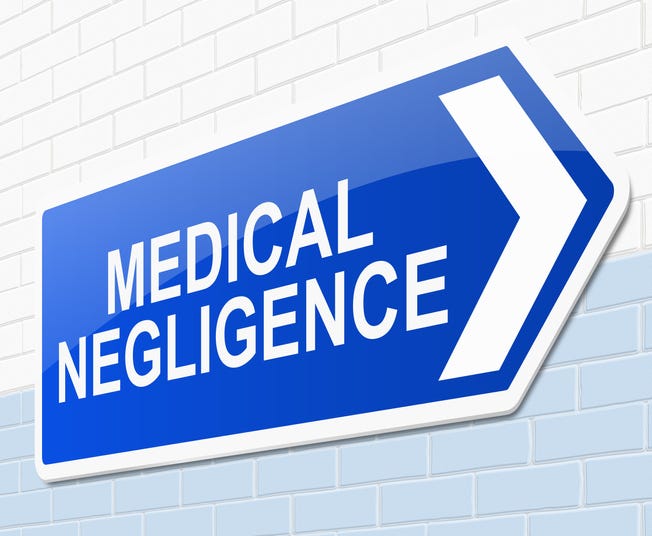Medical negligence (also known as clinical negligence) is substandard medical care provided by a healthcare professional to a patient, which leads to an injury or makes an existing condition worse. While the vast majority of medical procedures go on without any problems, mistakes can be made by a medical professional which might cause you harm.
Medical negligence can occur in a number of ways. Some of the most common types of medical negligence include:
· Misdiagnosis
· Failing to obtain full consent before an operation
· Failing to inform patient of the risks involved with a procedure
· Incorrect prescription or medication
· Surgical mistakes leading to injuries and further problems
While the examples listed above are unlikely to have happened on purpose, they can significantly affect your quality of life, and you can make a compensation claim for it. The medical negligence claim process can seem complex, but our specialist medical negligence solicitors are here to make it as hassle-free as possible.
You can speak with any of our specialist solicitors for free advice on 0800 644 4240 or fill our free claims assessment form to make arrangements for them to call at your convenience.
How to Make a Medical Negligence Claim?
Whether you received medical care at a private facility or at the hands of an NHS practitioner, the facts are the same: you have suffered harm as a result of medical mistakes and shouldn’t be responsible for the costs of your care. Claims for medical negligence compensation can be made against most medical professionals, including GPSs, dentists, nurses, cosmetic surgeons, and hospital staff (e.g., porters).
If your medical care was provided by a team of medical professionals, the cause of your injury due to negligence may be more difficult to determine, as it may have been a result of wider processes rather than the action of an individual. If this is your situation, your solicitor may be able to make a claim against a wider body, such as the management of the hospital or NHS Trust.
While medical negligence claims are basically the same for the NHS and private practices, there are slight differences. The main difference is that when making a medical negligence NHS claim, you must go through the Litigation Authority (NHS Resolution) — an independent body that manages claims made against the NHS.
How Hard Is It to Prove Medical Negligence?
Medical negligence claims are complex and difficult to prove; you would need the advice and support of an experienced solicitor who can investigate the facts of the case, gather evidence, consult experts, and build a robust case on your behalf.
On your own part, there are a few pieces of evidence that you can provide to help prove your case for medical compensation:
· Pictures of any physical injury you have suffered
· A detailed account of the harm you suffered and its impact on your life
· Records of the medical care you received that led to the negligent treatment
· Receipts of any expenses you have made as a result of your injuries (e.g., medication, trips to and from hospital, private medical care etc.)
On the part of your solicitor, they will need to help you prove the following:
· Breach of Care
In order to ensure a successful medical negligence claim, your solicitor must prove that the medical professional responsible for your care breached their duty of care when treating you, and that this has caused you harm.
If the quality of care you received fell below the expected standard for a medical professional, this may be deemed duty of care medical negligence and you may be entitled to compensation.
· Causation
A medical expert will need to examine you to determine the severity of your injury and level of damage caused. The official report they provide will help your medical negligence solicitors understand how much you might be eligible to receive in compensation if your case is successful.
Your solicitor will make arrangements for this and help you navigate the process, so you do not need to worry.
How Much Compensation Will I Receive for Medical Negligence?
Compensation in medical negligence cases vary from one case to another, as every case is unique. The amount of compensation will be determined by:
· The severity of your injury
· The level of pain, suffering and recovery time
· The impact on your life and ability to perform routine tasks
Keep in mind that NHS negligence payouts or compensation from a private healthcare provider is now about winning a jackpot. While the court will be unable to discipline the healthcare professional or hospital responsible for your care, your case may help them make improvements when rendering medical services in future.
If you would like to trigger a formal disciplinary process, you will need to issue a formal complaint, either through the NHS complaints procedure or other avenues for complaints.
Get In Touch With Us
For a free, no obligation consultation about making medical negligence claims, call us today on 0800 644 4240 to speak with one of our medical negligence experts or fill our free claims assessment form and we will call you at your convenience.
After considering the facts of your case, we will likely offer to work with you on a medical negligence No Win No Fee UK basis to help you manage the financial risks associated with making a medical negligence claim.
